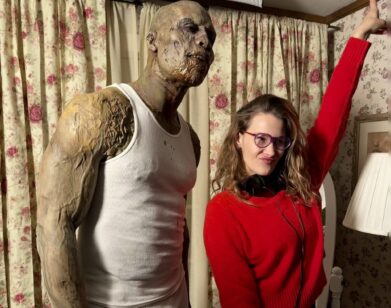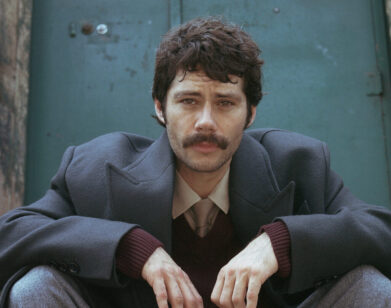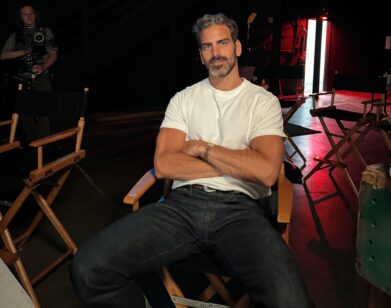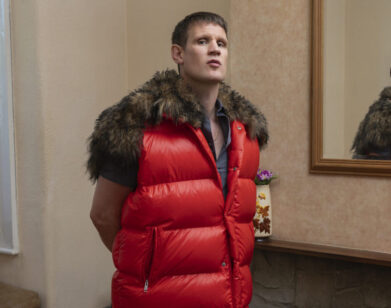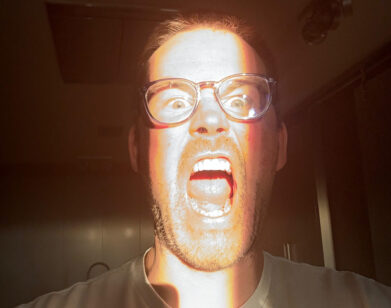The Rhythm of Memory
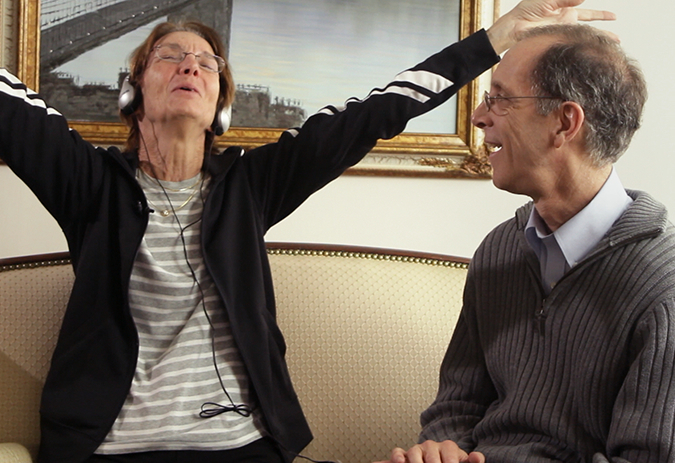
ABOVE: MARY LOU THOMPSON AND DAN COHEN IN ALIVE INSIDE. PHOTO COURTESY OF BOND 360.
Henry is barely verbal. Suffering from dementia, he’s been confined to a nursing home for 10 years. His head lulls down towards his chest. When a woman identifies herself as his daughter and asks him, “Which daughter am I?” he dismisses the question with an “I don’t know…I’ve got so many.” Place a pair of headphones over his ears with a gospel song playing, however, and everything changes. He begins to sing along. His eyes widen. He is responsive. Ask him to recall his favorite musician from his youth, and he answers. It’s Cab Calloway.
Henry listening to music is the first video you’ll encounter on the Music and Memory website, a non-profit dedicated to bringing personalized music into the thousands of nursing homes in America. The video has millions of views. It is also featured near the beginning Michael Rossatto-Bennett’s documentary, Alive Inside, which first premiered in January at Sundance and won The Audience Award. “These are a kind of people that we haven’t seen before,” explains the director of his subjects. “Much of their mind has been erased, so their ego is gone; their ability to lie is gone. We’re getting a chance to see human beings at their most elemental and in the place where they are the most pure, which is their relationship to their past and their memories.”
Out today in New York, Alive Inside is a rarity: an optimistic documentary about a desperate reality. Rossatto-Bennett follows his friend, social worker and Music and Memory founder Dan Cohen, as he visits patients in American nursing homes. Sterile and contained, the homes are a cross between a hospice and an orphanage—lifeless places where the US can fearfully hide away its elderly. With him, Cohen brings iPod shuffles, each with loaded a personal playlist intended to stimulate residents through memories of their youth. The residents are not, as Rosatto-Bennett admits, always effective, but when they are it looks like magic. “I like to say that we’ve made the only ‘good news’ film about Alzheimer’s ever,” he jokes. ” I think it is one of the most profound human desires to see another being wake up. That’s why we have children, that’s why we have relationships, that’s why we work. That’s why we do everything we do in our life.”
EMMA BROWN: How did the two of you first meet?
MICHAEL ROSSATO-BENNETT: We had a mutual friend who works in the Rubin Foundation. I was broke and she wanted to help me, so she said, “Why don’t you make a website for this guy—you know how to make websites, right?” I was like, “Yeah, of course,” but I’d only made one at that time. Then, when I met Dan and I heard what he was doing, I was like, “Oh my god, this is a story that should be told in film…I know how to make films. Lets do that!” We started filming and it was an amazing experience. Dan had all of this stuff inside of him that no one had ever seen—he’d met all these incredible people and had been moved by all these people. He showed me his work and it was an amazing world. I don’t know about you, but I was not really interested in going into a nursing home. I was actually afraid of nursing homes and afraid of the people that I would see there and the sights that met my eyes. But when I got the opportunity to experience these people through their music and through their aliveness when they were interacting with their music, it was a hugely human and opening experience for me. It completely transformed my experience of being in a nursing home. These places are amazingly lonely—50% of people don’t get any visitors ever. They come and they die. For me, the idea that we could inspire people and show them the experience we had giving gifts to these people through music, and that maybe we could create a swell of desire in others to receive by giving—that was my inspiration and why I labored in my bedroom with two guys making this film until my wife wanted to divorce me.
BROWN: How long did it take to make the film?
DAN COHEN: It about three to four years.
BROWN: Did you have a certain trajectory in mind when you started filming, or did you just take things as they came?
ROSSATO-BENNETT: From the first moment of experiencing Henry waking up, I knew what this film was. We all get in places where we’re not alive—I’m sure when you were a teenager, there was a period where life was boring and not exciting and depressing and then you got over that, and you never want to go back there. That’s how I feel about these people. Many of them have just slumped, if you will, into this place of non-livingness—as Naomi Feil [describes], some of these people become living-dead people. That’s what happens when you don’t have stimulation. Then somebody comes along and wakes you and gives you faith and gives you a reason to have joy. That’s one of the greatest gifts that we can give each other. That’s the impetus of all religion, of all education, of all society, of all family. From the very first moment I knew, this is a film about awaking. The rest of it was just labor.
BROWN: Dan, what gave you the idea to use music in the first place?
COHEN: I’m a social worker by training, but I had a career in technology companies. In 2006, I heard on the radio a journalist talking about how iPods are everywhere—they’re ubiquitous. And I thought, kids have them and adults, but in a nursing home, it didn’t seem too likely and if I’m ever in a nursing home, would I have access to my favorite ’60s music? So I Googled iPods and nursing homes and even though there are 16,000 nursing homes in the U.S., I couldn’t find one that was using iPods for the residents. I live on Long Island, and I called up my nearby county nursing home and I said, “I know music’s already widely used as your number one recreational activity, but can we see if there’s any value for you to totally personalize the music?” and they said, “Sure.” I came in with my laptop and some iPods and it was an instant and definitive hit.
BROWN: If 50% of the residents don’t get visitors, how do you find out what music is personal to them?
COHEN: We asked the family—we asked older relatives, brothers, sisters, children what did they listen to when they were young? Did they play a musical instrument? Were they in a chorus? Did they like to go to Broadway musicals or plays? Is there somewhere where their old records are sitting that will give you a tipoff? We did a little investigation work, but when there’s no family the staff will do a trial and error—they’ll sit down with a group and listen to music and track who is reacting to what song, and slowly, organically build that list with them.
BROWN: Did anyone have a really bad reaction to a particular song you played for them? As you say, music is very emotional, but it’s not always a positive emotion.
COHEN: That’s true. An example of that is this gentleman whose dad has dementia in a nursing home. I helped the nursing home set up his dad. I called up a couple of weeks later and asked the staff how it was going with Mr. So and So and they said, “We took away the iPod from him because he was crying.” I emailed his son and told him what happened and he said, “Well, what was my dad listening to when he was crying?” The nursing home gave me the name, I told the son, and the son said, “That was his parents’ wedding song. Please put the iPod back on—he’s got a lot of feeling still built up inside of him—and let him cry.” It’s okay to be in touch with our emotions.
BROWN: Of the five senses, the two that people generally pick out as being associated with memory are smell and hearing. Do you have an opinion as to which is more powerful?
ROSSATO-BENNETT: I have an answer to that. I think that smell is actually stronger. It’s less specific, but it’s definitely stronger because smell—the olfactory bulb—is literally inside the brain. There’s no mediation from smell. But, last I heard, Apple did not have the iSmellathon or the iSniff. Also, smells are not communally shared; music is communally shared, so it goes beyond your personal memory. It’s the memory of your time—music is the soundtrack of [people’s] lives. To be without the soundtrack of your life is actually inconceivable to a person like you or me or Dan. That’s why I think you see such a profound reaction in so many people.
Our lives are a book and they have endings, and there’s nothing wrong with that. People have to stop being afraid of the fact that we are mortal and we have a life cycle. We have an arc, and each part of that arc is profound, not just when we are hitting on all cylinders.
ALIVE INSIDE COMES OUT TODAY, JULY 18, AT THE SUNSHINE CINEMA IN NEW YORK CITY AND WILL EXPAND TO SELECT THEATRES ACROSS THE COUNTRY THROUGHOUT AUGUST. FOR MORE INFORMATION, VISIT THE FILM’S WEBSITE.

